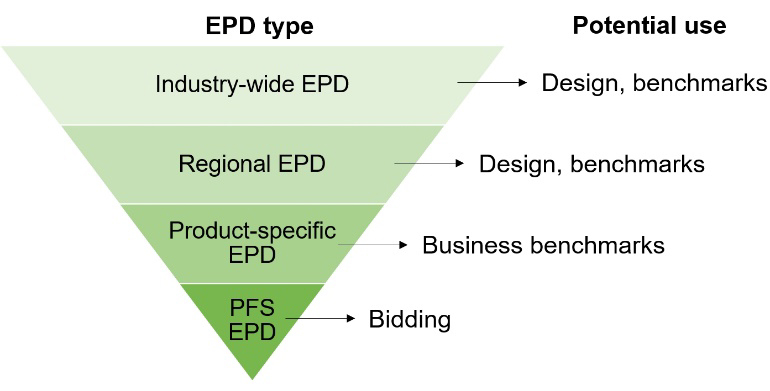
The Federal Highway Administration has awarded $204,000-$312,000 grants to support sustainable pavement, materials emissions tracking and related initiatives at more than 20 state departments of transportation. Many of the initiatives are centered on developing, adopting or advancing the use of life cycle assessment (LCA) methods and environmental product declarations (EPD). The latter encompass LCA data and are the most widely used tools for reporting carbon dioxide emissions associated with construction materials or products. U.S. DOT officials recognize the use of LCAs and EPDs as standard practice in highway construction project planning and pavement material specification.
The grants are part of the state DOTs’ participation in the FHWA Climate Challenge, launched earlier this year to demonstrate the role of sustainable construction materials in reducing greenhouse gas (GHG) emissions tied to highway projects. The funding stems from the White House Federal Buy Clean Initiative, promoting the use of American-made, lower carbon materials in federal procurement programs and federally funded building or nonbuilding projects.
The FHWA Climate Challenge is among U.S. DOT efforts to encourage state or local transportation agencies to identify innovative ways to reduce transportation sector GHG emissions. It presents a unique opportunity to improve the sustainability of pavement structures and work toward net-zero emissions, Department officials note. The Challenge likewise aligns with the Infrastructure Investment and Jobs Act-funded Carbon Reduction Program, unlocking $6.4 billion in formula funding over five years.
“Climate Challenge will provide state transportation agencies with resources to inform pavement engineering decisions that sport reduced environmental impacts in highway projects,” affirms Acting Federal Highway Administrator Stephanie Pollack.
The Challenge will initially see FHWA host peer exchanges or webinars and develop case study reports to share lessons learned, outcomes and next steps. Through 2024, participants will receive training and work with industry and academia stakeholders to implement projects that quantify pavements’ environmental impacts using LCAs and EPDs.
WHITE HOUSE WEIGHS GHG ACCOUNTING RULE COVERING FEDERAL CONTRACTORS
The White House-proposed Federal Supplier Climate Risks and Resilience Rule outlines greenhouse gas (GHG) emissions disclosure requirements applicable to companies performing construction or other services for federal projects, facilities and agencies. “Major” contractors, or those booking more than $50 million annually in federal contracts, would have to disclose Greenhouse Gas Protocol-defined Scope 1, 2 and 3 emissions levels plus climate-related financial risks, and set GHG emissions reduction targets. “Significant” contractors, or those booking $7.5 million-$50 million annually in federal contracts, would have to report Scope 1 and Scope 2 emissions.
The proposed rule cites the global CDP (formerly Carbon Disclosure Project) and Science-Based Targets initiative (SBTi) GHG reporting mechanisms. It calls for contractors reporting Scope 1 and Scope 2 emissions figures through CDP or comparable audit method, and GHG emissions reduction target validation through SBTi. The White House Council on Environmental Quality has opened the Federal Supplier Climate Risks and Resilience Rule to public comment through early 2023. Concurrently, the Department of Defense, General Services Administration and National Space and Aeronautics Administration have propose a rule, “Disclosure of Greenhouse Gas Emissions and Climate-Related Financial Risk,” amending the Federal Acquisition Regulation to mirror “Federal Supplier Climate Risks and Resilience Rule” Major and Significant contractor guidelines. The proposed rules exempt contractors with less than $7.5 million in annual federal contracts.